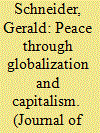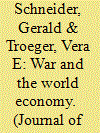| Srl | Item |
| 1 |
ID:
179559


|
|
|
|
|
| Summary/Abstract |
Studies of China's Belt and Road Initiative (BRI) have focused on the strategic intentions of Beijing, with much less attention paid to its political effects. The argument that the initiative can improve political relationships with BRI countries is assumed rather than empirically grounded. This paper bridges the gap by studying countries’ cooperation and conflict with China. I find that (a) the initiative appears to marginally improve BRI countries’ cooperation and significantly reduce low-intensity conflict; (b) the cooperation-promoting effect is driven only by neighboring countries while the restraining effect for low-intensity conflict results primarily from non-neighboring countries; and (c) there is no systematic evidence so far that the initiative has any effect on high-intensity conflict. These results offer mixed evidence of commercial liberalism in the context of the BRI: money (or the potential thereof) can induce cooperation in the short run, but it may not be enough to fundamentally change interstate relations.
|
|
|
|
|
|
|
|
|
|
|
|
|
|
|
|
| 2 |
ID:
070264


|
|
|
| 3 |
ID:
128865


|
|
|
|
|
| Publication |
2014.
|
| Summary/Abstract |
The security externalities of globalization and capitalism continue to play an influential role in peace research. Typical contributions to these interrelated areas of scientific inquiry address the hope that the external openness (commercial liberalism) and the internal freedom of an economy (capitalist peace) pacify interstate as well as intrastate relations. I claim, despite the empirical support both theses have received, that they face considerable analytical hurdles. Commercial liberalism has, on a theoretical level, not yet moved much beyond the opportunity cost arguments that enlightenment philosophers first advanced more than 200 years ago. The capitalist peace research program similarly does not offer clear micro-level mechanisms explaining why the interactions between economic agents and political decisionmakers should be more peaceful in capitalist than in state-dominated economies. Drawing on the political economy literature, I argue that economic liberalism should distinguish between level- and change-effects of both globalization and capitalism and that thinking in analogies between domestic and interstate peace has prevented the field from making analytical headway. Both literatures will only profit from the advent of 'big data' in the case that the field addresses the theoretical challenges upfront.
|
|
|
|
|
|
|
|
|
|
|
|
|
|
|
|
| 4 |
ID:
073759


|
|
|
|
|
| Publication |
2006.
|
| Summary/Abstract |
One of the perennial questions in the scientific study of war is how war affects the economy. The authors examine the influence that the political developments within three war regions had on global financial markets (CAC, Dow Jones, FTSE) from 1990 to 2000. They embed a rational expectation framework within commercial liberalism, a theoretical strand that tries to assess the interrelationship between war and economic exchanges. Time-series analyses account for the effects that the conflict between Israel and the Palestinians, the first confrontation of a U.S.-led alliance against Iraq, and the wars fought in Ex-Yugoslavia exerted. Using daily stock market data, the authors show that the conflicts affected the interactions at the core financial markets in the Western world negatively, if they had any systematic influence at all. They argue that these results lend some support to the rational expectations version of commercial liberalism.
|
|
|
|
|
|
|
|
|
|
|
|
|
|
|
|